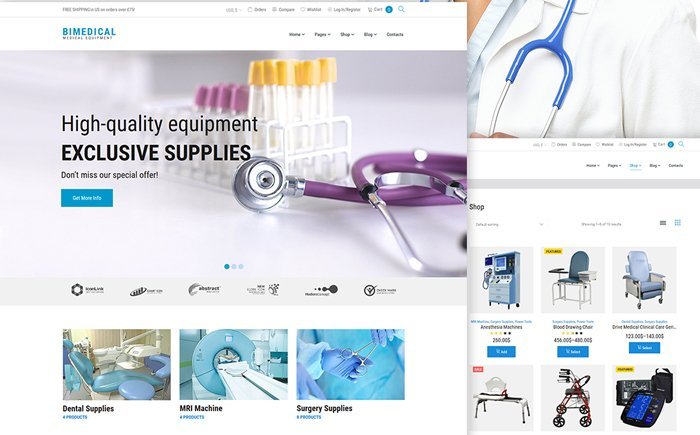The medical supply market is developing at a rapid pace, meaning there is still enough room for new players. According to research conducted by Market Research Future, the market share will exceed $131 billion by 2022 with most of the opportunities provided by private and public hospitals.
The American healthcare market will have the most significant piece of this pie, with an estimated market share evaluation of $3 trillion, with other valuable players like China and Japan holding a combined market share of over $1 trillion.
Thus, selling medical supplies and equipment online has become a profitable business both for producers and distributors. The end customers also have enough to gain as prices drop and there are more companies and products they have access to, no matter where they live.

According to Markets and Markets, the growth rate of online medical equipment stores is 7% per year, which is why many small businesses take advantage of this opportunity and try their luck in this field. If you own a similar business and decided to cater to the needs of national and international customers via a website, here are some easy tips to make sure it blooms.
Finding the right name for your website
You want a name that your customers will easily remember that is also linked to your company profile. Avoid adding cliche words like “medical supplies” in the name as there are many other businesses that do the same thing. If you want your website name to be easily remembered, use catchy keywords like “health” or “pharma” instead.
Decide on a niche market that works for you
The medical supply market is too big to cover on your own, and this is why it is important to establish which type of products you will be selling. Conduct some research and make the best decision for your business, according to the rules and regulations of your state, and the local distributors you are counting on.
Some online medical stores focus on catheter access ports, feeding tubes, vinyl exam gloves, and all other accessories, while others sell vitamins, supplements, beds, home tests, and canes.
There is also the option of selling medical gadgets only, both for domestic and medical use but only if you can find the right suppliers at decent prices. Stethoscopes, borescopes, microscopes or endoscopes are used by students, doctors, and regular people alike, and this review will show you some of the acclaimed products on the market that you could focus on.
You could also focus on a niche to rapidly increase your success rate. Given that obesity and diabetes are the most common pre-adult and adult conditions in the United States, you can create a website that caters to the needs of these patients, with products like insulin watchers and monitors, sensors, hygiene items, and others.
Handle the legal matters
Selling medical supplies and drugs is a sensitive practice that needs to be conducted under the strict rules and regulations of the FDA. Keep in mind that some products cannot be shipped internationally as they may not be recognized as safe by the medical authorities of other states.
The same goes for certain devices, drugs, and medical supplies that might be marketed as safe to sell and use in certain world regions, like the European Union but were not yet tested and approved by the FDA.
Either way, you should always notify the FDA about any actions that imply transporting and handling medical substances and supplies outside or on the territory of the United States.
There are also other legal concerns that you must consider to not be held responsible for the misuse of the products you are selling. Create a disclaimer page on your website that clearly states that all medical supplies, accessories, and drugs should only be used or taken after consulting with your physician and that your company’s only purpose is to distribute these supplies.
Lastly, if you plan on conducting business within the European Union, you must know about GDPR or the General Data Protection Regulation regarding the use of personal data from your clients.
Unlike the United States where some sensitive information (such as full name, address, bank records, criminal records or even some medical records) about clients is available to the public, in the European Union you can be prosecuted if you disclose the information to third parties.